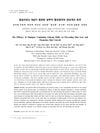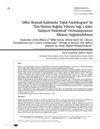 1 citations,
March 2011 in “Infertility”
1 citations,
March 2011 in “Infertility” Hormone imbalances from the pituitary, thyroid, and adrenal glands can cause infertility, but treating these disorders can improve fertility.
 November 2024 in “Research Square (Research Square)”
November 2024 in “Research Square (Research Square)” Lipids may help treat hair loss by promoting hair growth through the HIF-1 pathway.
 July 2024 in “ADMET & DMPK”
July 2024 in “ADMET & DMPK” Surface-modified nanostructured lipid carriers can improve hair growth treatments.
 April 2024 in “Journal of cancer research and clinical oncology”
April 2024 in “Journal of cancer research and clinical oncology” Tissue-derived extracellular vesicles are crucial for cancer diagnosis, prognosis, and treatment.

N793 may improve hair density in people with mild hair thinning.
 January 2024 in “İstanbul Kuzey Klinikleri”
January 2024 in “İstanbul Kuzey Klinikleri” Low ferritin levels are linked to increased hair loss; no link found between vitamin B12, TSH levels, and hair loss.
 January 2024 in “Regenerative Biomaterials”
January 2024 in “Regenerative Biomaterials” Dissolvable microneedles with Ginsenoside Rg3 can help treat hair loss by improving drug delivery and stimulating hair growth.
 January 2024 in “Wiadomości Lekarskie”
January 2024 in “Wiadomości Lekarskie” Robotic hair transplantation with AI offers more reliable, precise, and efficient hair restoration.
 November 2023 in “npj regenerative medicine”
November 2023 in “npj regenerative medicine” Skin spheroids with both outer and inner layers are key for regrowing skin patterns and hair.
 November 2023 in “Regenerative Biomaterials”
November 2023 in “Regenerative Biomaterials” The new adhesive seals wounds quickly, works well in wet conditions, and helps with healing.
 November 2023 in “Frontiers in cell and developmental biology”
November 2023 in “Frontiers in cell and developmental biology” Hair aging is caused by stress, hormones, inflammation, and DNA damage affecting hair growth and color.
 November 2023 in “bioRxiv (Cold Spring Harbor Laboratory)”
November 2023 in “bioRxiv (Cold Spring Harbor Laboratory)” Scientists made a mouse that shows how a specific protein in the skin changes and affects hair growth and shape.
 October 2023 in “bioRxiv (Cold Spring Harbor Laboratory)”
October 2023 in “bioRxiv (Cold Spring Harbor Laboratory)” Immune cells are essential for early hair and skin development and healing.
 May 2023 in “Current Medicinal Chemistry”
May 2023 in “Current Medicinal Chemistry” Microneedle patches improve drug delivery for skin treatments and cosmetic enhancements.
 November 2022 in “CARDIOMETRY”
November 2022 in “CARDIOMETRY” A group has developed therapies that show promise for treating cancer and various other conditions.
 November 2022 in “Nihon Nyuusankin Gakkaishi/Nihon Nyūsankin Gakkaishi”
November 2022 in “Nihon Nyuusankin Gakkaishi/Nihon Nyūsankin Gakkaishi” The lotion with N793 strain significantly increased hair density and reduced hair loss safely.

Human hair keratins can be turned into useful 3D biomedical scaffolds through a freeze-thaw process.
 June 2021 in “bioRxiv (Cold Spring Harbor Laboratory)”
June 2021 in “bioRxiv (Cold Spring Harbor Laboratory)” KIF18B is important for correctly positioning cell division machinery in skin cells, affecting hair follicle development.
 July 2020 in “bioRxiv (Cold Spring Harbor Laboratory)”
July 2020 in “bioRxiv (Cold Spring Harbor Laboratory)” The structure of SRD5A reveals how it reduces steroids, aiding drug design for related health conditions.
 June 2020 in “bioRxiv (Cold Spring Harbor Laboratory)”
June 2020 in “bioRxiv (Cold Spring Harbor Laboratory)” The HoxC gene cluster and its enhancers are essential for developing hair and nails in mammals.

Human hair keratins can self-assemble and support cell growth, useful for biomedical applications.
 November 2019 in “Harper's Textbook of Pediatric Dermatology”
November 2019 in “Harper's Textbook of Pediatric Dermatology” Understanding normal hair growth and loss in children is key to diagnosing and treating hair disorders.

Skin stem cells are crucial for maintaining and repairing skin, with potential for treating skin disorders and improving wound healing.
 January 2016 in “Springer eBooks”
January 2016 in “Springer eBooks” New materials and methods could improve skin healing and reduce scarring.
Avicennia Marina extract and avicequinone C can reduce hair loss hormone production and increase hair growth factors, suggesting they could be used to treat androgenic alopecia.
 December 2013 in “Biomedical and biopharmaceutical research”
December 2013 in “Biomedical and biopharmaceutical research” Nanotechnology shows promise for better drug delivery and cancer treatment.

Chemotherapy can cause skin issues and hair loss, and this guide explains how to manage them.
 September 2013 in “Daehan hwajangpum hakoeji/Daehan hwa'jangpum haghoeji”
September 2013 in “Daehan hwajangpum hakoeji/Daehan hwa'jangpum haghoeji” Shampoo with ginseng helped improve hair thickness, density, growth, and reduced hair loss.

Millet extract, wheat germ oil, L-cystine, and calcium pantothenate reduced hair loss and improved hair growth in women with diffuse alopecia.
 June 2008 in “British Journal of Dermatology”
June 2008 in “British Journal of Dermatology” Herpes gestationis is linked to certain antigens, atopic eczema affects T cell populations and may be eased by breastfeeding, higher doses of anti-androgen treatment can improve androgenic alopecia, topical minoxidil increases hair thickness, long-term methotrexate therapy can cause liver fibrosis in psoriasis patients, and Lichen Sclerosus et Atrophicus patients aren't at higher risk for autoimmune disorders.





























